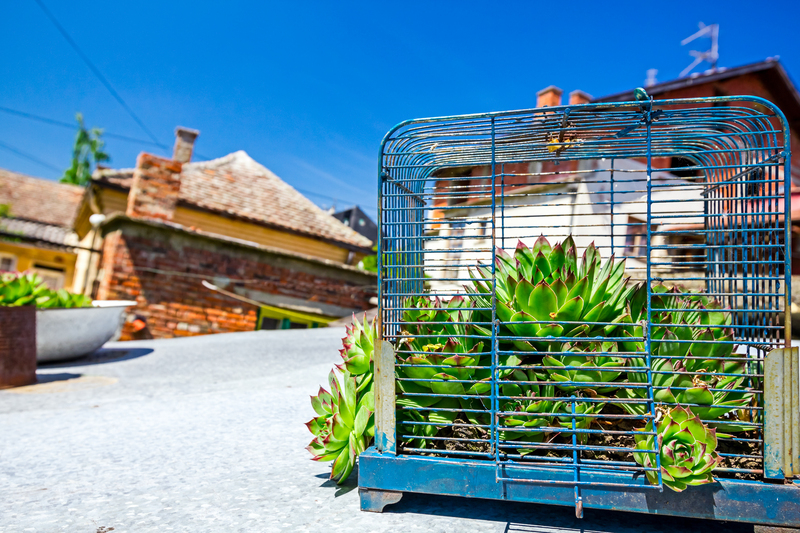Garden Like a Pro: 9 Indispensable Tips for Gardening Beginners
Posted on 27/08/2025
Garden Like a Pro: 9 Indispensable Tips for Gardening Beginners
Embarking on your gardening journey is both exciting and rewarding. Whether you have a sprawling backyard or just a few pots on a balcony, learning the right techniques from the start sets you up for a lifetime of green-thumbed success. This comprehensive guide delivers essential gardening tips and practical advice for all gardening novices eager to cultivate healthy plants and vibrant gardens. Discover how to garden like a seasoned pro with these nine indispensable tips!
Why Start Gardening?
Many beginners ask themselves, "Why should I try gardening?" Beyond growing beautiful plants, gardening offers numerous benefits, including:
- Stress relief through connection with nature
- Access to fresh, home-grown produce and flowers
- Enhanced physical fitness with regular activity
- Improved mental well-being from nurturing living things
- Biodiversity support that attracts pollinators, birds, and insects to your space
Ready to get started? Let's dive into the best gardening advice for beginners!

1. Understand Your Growing Zone and Microclimate
Know Your Hardiness Zone
Before sowing your first seed, identify your local climate zone. In the United States, the USDA Hardiness Zone Map helps you determine which plants are most likely to thrive in your region.
Tip: Look up your zone online or check with local nurseries. Planting what grows naturally in your area is the first step toward gardening success!
Microclimates Matter
Even within your yard, there are mini-climates - areas that receive more or less sun, are windier, or have subtle temperature differences. Observe your space throughout the day to notice patterns of sunlight and shade. Choosing plants adapted to these micro-conditions will result in healthier growth and fewer failures.
2. Choose the Right Location for Your Garden
Location is everything in gardening! Most vegetables and flowering plants need a minimum of 6 hours of direct sunlight daily. Observe your outdoor space: does a certain spot receive more morning sun, or is it shaded by trees or buildings?
- Vegetable gardens thrive in spaces with full sun exposure
- Herbs and shade-loving flowers, such as hostas and impatiens, can flourish with less sunlight
Beginner's tip: Avoid placing your garden too close to large trees, which can compete with your plants for water and nutrients.
3. Test and Prepare Your Soil
Soil Testing
Healthy plants begin with healthy soil. Purchase an easy-to-use soil test kit from a garden center or send a sample to your local cooperative extension service. Key elements to test for:
- pH Level (most plants prefer a pH of 6.0 to 7.0)
- Nutrient contents: nitrogen, phosphorus, potassium
- Soil texture: sandy, loamy, or clay
Amend your soil as needed based on your test results.
Improve Soil Quality
Enrich your garden soil with organic matter like compost, well-rotted manure, or leaf mulch. Healthy soil retains moisture better and gives your plants the vital nutrients they need to thrive.
- Work compost into your soil at the start of each planting season.
- Aim to keep your soil crumbly and loose for robust root growth.
Strong soils build strong gardens!
4. Select Easy-to-Grow Plants for Your First Garden
Some plants are much friendlier to beginners and are forgiving even when care isn't perfect. As you grow more confident, you can branch out into more challenging varieties.
Recommended Beginner Plants:
- Vegetables: Radishes, lettuce, beans, carrots, cherry tomatoes
- Herbs: Basil, mint, parsley, chives
- Flowers: Marigolds, nasturtiums, zinnias, sunflowers, pansies
Start small and focus on a few favorites. Success with easy plants boosts your confidence and builds essential skills.
5. Learn Proper Watering Techniques
Overwatering and underwatering are two of the most common beginner mistakes. Mastering the art of watering is key to learning how to garden like a pro.
Watering Tips:
- Water deeply and less frequently to encourage strong roots.
- Check soil moisture with your finger--only water when the top inch feels dry.
- Water early in the day to reduce evaporation and prevent common plant diseases.
- Avoid wetting the leaves where possible. Focus water at soil level, especially for vegetables and roses.
Consider installing a drip irrigation system or soaker hoses for effortless, consistent watering.
6. Master Mulching
Mulch is your garden's best friend. It suppresses weeds, locks in soil moisture, and protects roots from extreme temperature swings.
- Organic mulches: Shredded bark, straw, compost, dried grass clippings
- Inorganic mulches: Pebbles, landscape fabric, gravel (best for ornamental beds)
Apply a layer of 2-3 inches of mulch around your plants, keeping it a few inches away from stems to prevent rot. Refresh mulch as needed throughout the season.
7. Feed Your Plants Right
Just like people, plants need food. Fertilize your garden to replenish essential nutrients and encourage ongoing growth.
Fertilizing Tips:
- Read fertilizer labels carefully and follow instructions.
- Use a balanced slow-release granular fertilizer for steady nutrition.
- Compost and organic feedings are great eco-friendly choices.
- Don't over-fertilize--too much can burn and damage your plants.
Note: Different plants have different nutrient requirements, so tailor your fertilizing regimen to their specific needs.
8. Learn How to Control Pests Naturally
Pests and diseases can frustrate even the most enthusiastic beginner gardener. The good news? Many problems can be managed organically and safely--no harsh chemicals required!
Natural Pest Control Strategies:
- Attract beneficial insects such as ladybugs and lacewings that prey on garden pests.
- Introduce companion plants like marigolds, which repel aphids and nematodes.
- Handpick larger pests like caterpillars or beetles for immediate relief.
- Use homemade sprays, such as diluted neem oil, for common leaf diseases.
- Rotate your crops yearly to break the life cycles of persistent diseases and bugs.
Pro tip: Keep your garden clean by removing dead leaves and debris, which often harbor pests and fungi.
9. Don't Be Afraid to Make (and Learn From) Mistakes
Every gardener--no matter how experienced--kills a few plants along the way. Gardening is a process of discovery and learning. With each season, you'll hone your knowledge and develop a style that's uniquely yours.
- Keep a garden journal to record what works--and what doesn't--in your plot.
- Celebrate your successes and note your setbacks.
- Ask for help from local gardeners, online forums, or gardening clubs.

Frequently Asked Questions for Gardening Beginners
How Much Time Does a Beginner Garden Take?
Start small: a few containers or a raised bed require less than 30 minutes of attention a day. As you gain experience, you can expand your efforts.
What's the Best Time to Start Gardening?
Spring is the traditional starting time for most regions, but autumn and late summer are ideal for planting perennials, trees, and some fall crops.
Do I Need Expensive Tools to Get Started?
Not at all! The basic tools every gardening novice will need are:
- Hand trowel
- Watering can or garden hose
- Pruning shears
- Gardening gloves
- Shovel (for larger gardens)
Invest in sturdy, quality tools, but don't feel pressured to buy everything at once.
Final Thoughts: Cultivate Your Love of Gardening
With these nine expert gardening tips for beginners, you're ready to start your journey toward a healthier, greener, and more fulfilling lifestyle. Remember: Every master gardener started just where you are now--with curiosity, a few seeds, and plenty of hope.
As you tend your first garden, embrace the joys of nurturing life and watching your efforts bloom. With patience, observation, and practice, you'll soon be gardening like a pro!
Happy Gardening!
Your future garden--and your future self--will thank you.
Latest Posts
From Scraps to Soil: Enriching Gardens Naturally
Craft a soothing outdoor retreat with Zen garden ideas
Unleash Your Creativity with Container Gardening

